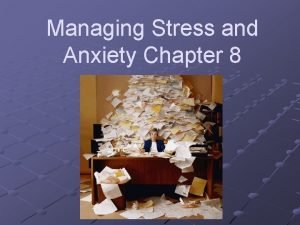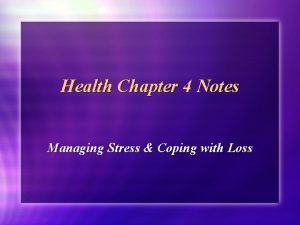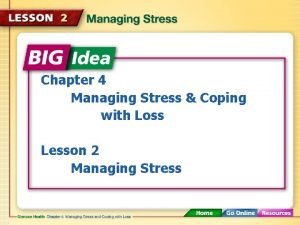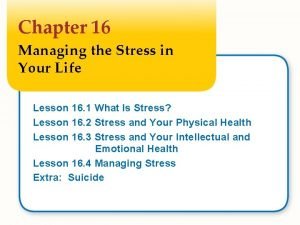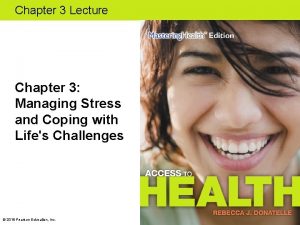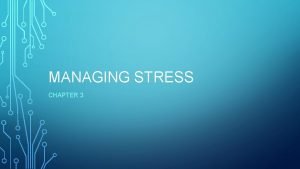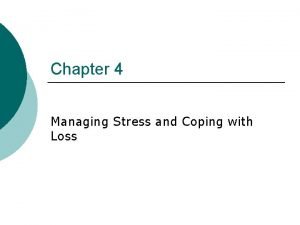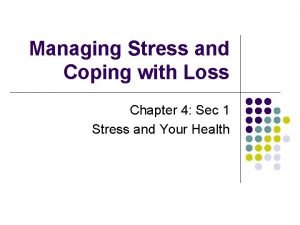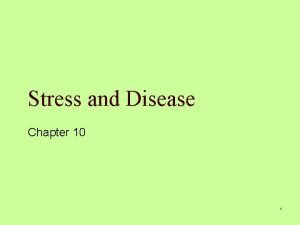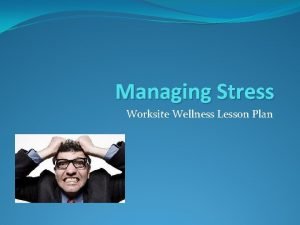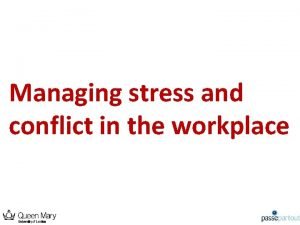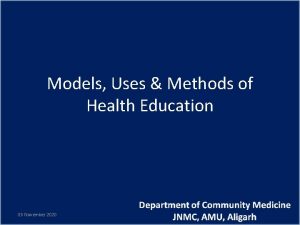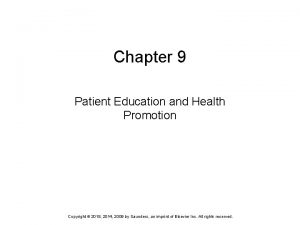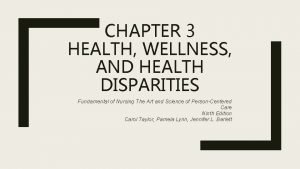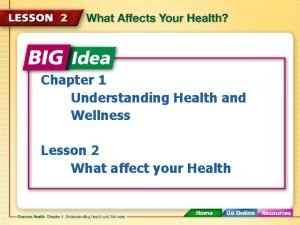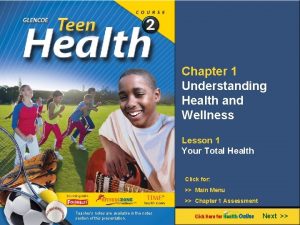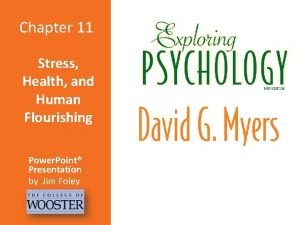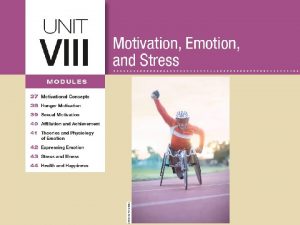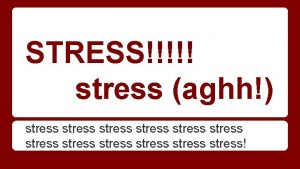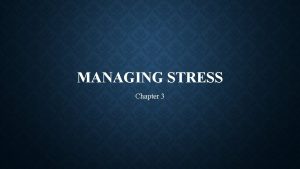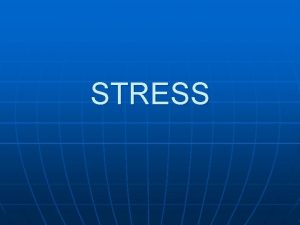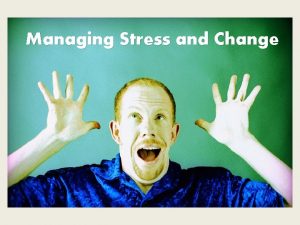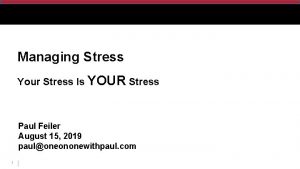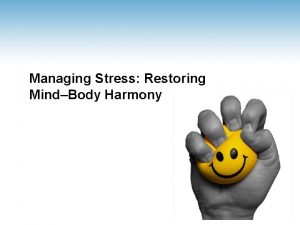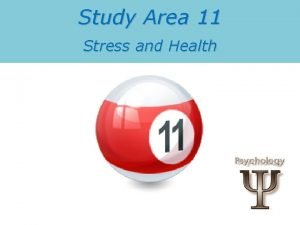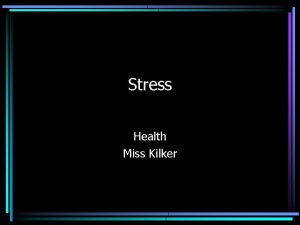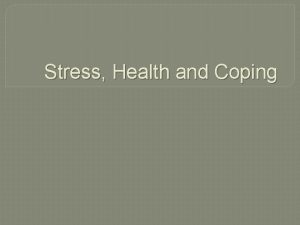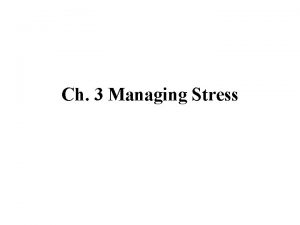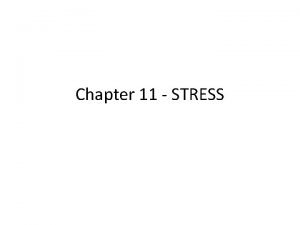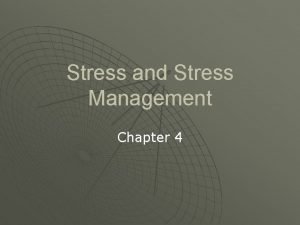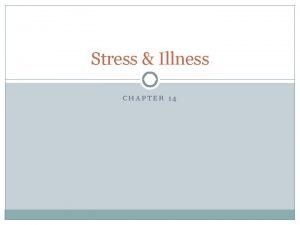Chapter 3 Managing Stress Ms Fitchwell Health Education























- Slides: 23

Chapter 3: Managing Stress Ms. Fitchwell Health Education

Chapter 3: Managing Stress • What Causes Stress? • How Stress Affects the Body • Stress and Personality • Managing Stress

So just what is stress and what causes it? ? ? • STRESS: is a reaction of the body and mind to threatening or challenging events in one’s life. • You experience stress when situations, events, or people make demands on your body and mind

What Causes Stress? • STRESSOR: something that causes stress – Major life changes: new school, moving to a new town – Everyday problems: lost shoe, missing keys, etc. – Physical surroundings: crowded bus, weather, jammed locker • At moderate levels, stress can improve your ability to concentrate and perform at your best.

Stress can be positive!!! • Positive Stress – Promotes growth and accomplishment • Also called EUSTRESS – Examples: • Feelings before athletic event/ musical performance • Does it help you to perform better?

Stress can be Negative • Negative Stress – Decreases ability to concentrate and perform – Also called DISTRESS – Examples: • Nervous to the point of being sick to your stomach • Difficulty doing every day tasks Boo for negative stress.

How Stress Affects the Body: Stages of Stress 1. Alarm Stage: Body releases adrenaline into the – FIGHT OR FLIGHT bloodstream: – – – Burst of energy Heart beats faster Increased rate of breathing Muscles tighten Pupils widen Mind more alert to take in information RESPONSE: a series of physical changes that prepare the body to react to stress – Either “fight” the stressor OR “take flight” and escape

Stages of Stress 2. Resistance Stage – Body tries to recover from alarm stage and go back to normal • Your body adapts to the continued presence of the stressor • As a result you body may become: – – – Tired Irritable Less able to handle added stress

Stages of Stress 3. Exhaustion Stage: Body is worn down and no longer has enough energy to fight off the stressor – – More susceptible to illness, because body remains in unbalanced state Most likely to enter this stage if stressor is out of your control, or if stressor continues for a long time

How Stress Affects the Body: Recognizing the Signs of Stress • Physical Signs – – – Muscle tension Headache Upset stomach Pounding heart Increased sweating Trembling/ twitching • Emotional Signs – – – – – Irritability Anger Impatience Nervousness Forgetfulness Negative thinking Excessive worrying Loss of interest Begin to cry easily

How Stress Affects the Body: Recognizing the Signs of Stress • Behavioral Signs By recognizing these signs early, you may also be able to prevent some of the more serious effects of stress. – – – Loss of appetite Overreacting Drug abuse Sleep problems Hurrying Withdrawing from relationships – Criticizing others – Fidgeting

Stress and Illness • Severe or prolonged stress can affect health • Illness can be brought on or made worse by stress – Body less able to fight off infection – Makes some conditions more difficult to control • Asthma: attacks more likely • High Blood Pressure: increased blood flow • Heart Disease: heart must work harder when under stress

Stress and Personality • How you react to a stressor could depend on…. – Is this situation a threat to my well- being? – Do I have the necessary resources to meet the challenge? • • Time Skills Experience Energy • Just as your personality is unique, so is the way you react to potentially stressful situations

Stress and Personality: Optimism VS Pessimism Optimism: The tendency to focus on the positive aspects of a situation Pessimism: The tendency to focus on the negative and expect the worse. Do you look at the glass at half full or half empty?

Stress and Personality Perfectionist: A person who accepts nothing less than excellence. • Sets goals that are impossible to attain and never satisfied with what they have accomplished

How to break the cycle of perfectionism • It’s not easy!!! Ø Accept that you cannot be perfect Ø Take pride in the things you do well Ø Don’t focus on your mistakes

Stress and Personality • Resilience: The ability to recover or “bounce back” from extreme or prolonged stress • Key factor in resilience is having the support of family and friends

Coping with Stress • Managing stress helps to restore the balance in you life • Managing stress prevents the stressors from taking control and making you ill • Additional ways to handle stress – – Eat well Exercise regularly Express your feelings Say “NO” to alcohol and drugs

Coping with Stress • Time Management – Do you often wish there were more hours in the day? – Do you put things off until the last minute? – Poor time management is one of the BIGGEST contributors to stress

Coping with Stress • Mental Rehearsal: To practice an event in your mind without actually doing the event ØImagining yourself performing at your best • Have you used mental rehearsal before an event? • Did it help your performance?

Managing Stress: Stress Management Techniques • Physical Activity – Provide the body with an outlet for built up energy – Take your mind off problems – Give yourself a chance to relax – Do activities that you enjoy

Coping with Stress • Relaxation: A state when the mind and body are resting – Deep breathing relaxes muscles, take in more oxygen which helps the body function better – Progressive relaxation: concentration on each group of muscles in the body one at a time • Lets try!!! – Read a book, take a nap, listen to music, stretching, take a hot shower, etc.

Coping with Stress • Humor – Laughter helps to relieve feelings of stress – Deal quickly with stressor – Can be harmful if laughter is used to cover up true feelings or if used inappropriately • Getting Help When You Need It – Recognize when stress is becoming overwhelming – Sharing your problems often helps you to see them more clearly
 Chapter 8 managing stress and anxiety
Chapter 8 managing stress and anxiety Leasiest
Leasiest Chapter 4 lesson 2 managing stress answer key
Chapter 4 lesson 2 managing stress answer key Chapter 16 managing the stress in your life
Chapter 16 managing the stress in your life Chapter 3 managing stress
Chapter 3 managing stress Chapter 3 managing stress
Chapter 3 managing stress Chapter 4 managing stress and coping with loss
Chapter 4 managing stress and coping with loss Chapter 4 managing stress and coping with loss
Chapter 4 managing stress and coping with loss Chapter 10 stress responses and stress management
Chapter 10 stress responses and stress management Managing stress
Managing stress Organization change and stress management
Organization change and stress management Stress and conflict introduction
Stress and conflict introduction True strain formula
True strain formula Axial stress vs normal stress
Axial stress vs normal stress Distinguish between education and health services
Distinguish between education and health services Difference between health education and health propaganda
Difference between health education and health propaganda Chapter 9 patient education and health promotion
Chapter 9 patient education and health promotion Chapter 3 health wellness and health disparities
Chapter 3 health wellness and health disparities Chapter 1 understanding health and wellness lesson 2
Chapter 1 understanding health and wellness lesson 2 Understanding your health and wellness chapter 1
Understanding your health and wellness chapter 1 Stress health and human flourishing
Stress health and human flourishing Module 43 stress and health
Module 43 stress and health Chapter 1 managing risk when driving
Chapter 1 managing risk when driving Distractions outside a vehicle are more easily managed
Distractions outside a vehicle are more easily managed
